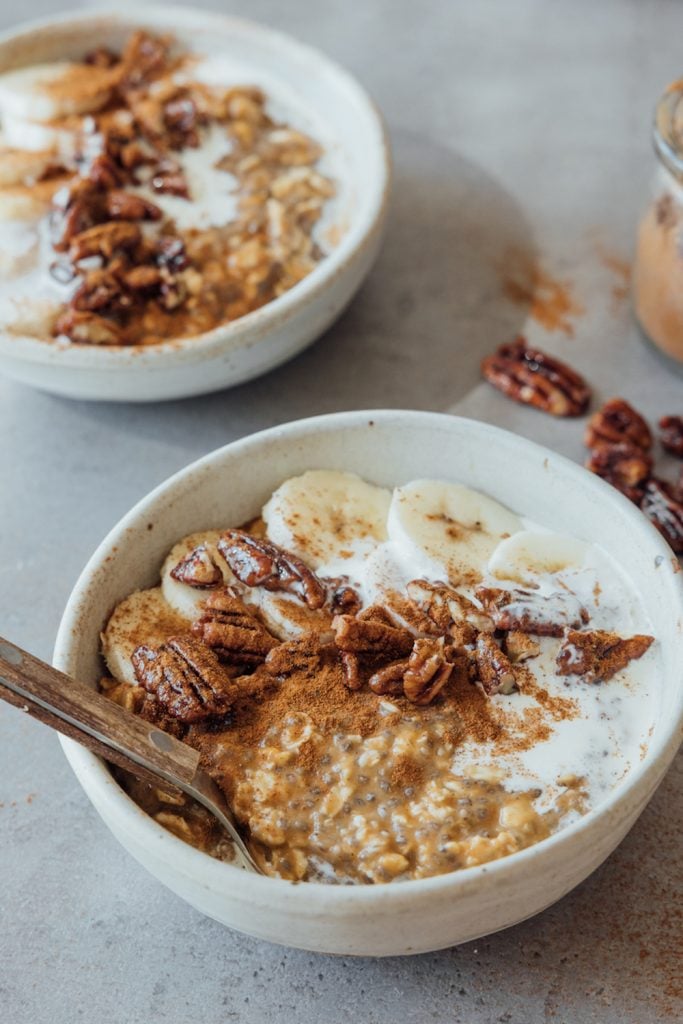We’ve all been there: we can’t get enough of a comforting dish or indulgent appetizer, and suddenly, that overly full feeling hits. Be it shoveling leftover short ribs while doing dishes or licking the brownie dough bowl clean, it’s easy to go from blissfully satiated to bursting at the seams. Although we’re all about food freedom, building healthy eating habits starts with mindfulness. And unfortunately, being mindful is often an afterthought. That’s why the question of how to digest food faster is one met with a whole lot of confusion. Luckily, we have answers.
Many of us eat in a hurried, distracted, or stressed state. In turn, we’re out of touch with our fullness cues. Whether we’re gearing up for a season of indulgence or simply looking to keep our gut health in check, learning how to digest food faster can provide some much-needed relief after a big meal. Ahead, these tips are geared to improve digestion after relishing a big meal.
Featured image by Michelle Nash.

Speak Kindly to Prevent Food Guilt
After you eat past comfortable fullness, it’s easy to go down the self-destruction rabbit hole. Been there, done that. Be it guilt, shame, or loathing, swimming in negative inner-dialogue won’t help you digest your food any faster—nor will it make you feel any better. Instead, try flipping your language. Rather than, “I shouldn’t have eaten that extra cookie,” you’d say, “I allowed myself the pleasure of enjoying that third cookie, but now I am feeling overly full.” How you speak to yourself can make all the difference.
Is overeating normal?
Overeating can be a normal tendency for many—i.e., spooning an extra helping or eating beyond satiety at a meal or celebration. It’s important to recognize that sometimes we overindulge because food tastes divine (that said, be mindful that food manufacturers are good at making their products addicting!). At any rate, try focusing more on the experience of eating (pay attention to textures, flavors, sensations, etc.) and it may help you make a more conscious decision about eating past comfortable satiation.
Keep in mind that occasional overeating is different than binge eating disorder. To heal your relationship with food, NEDA is here to help.


All About Gut Health
Switching gears, let’s talk about gut health. When it comes to digestion, gut health is foundational. An ever-growing amount of research points to the enormous role gut plays in overall health and wellbeing. A balanced gut is necessary for proper digestion, but having enough good bacteria supports blood sugar management, hormone balance, immune health, etc.
Speaking of immune support, more than 70% of your immune system resides in your gut. Particularly during the colder months of the year, it’s worth keeping your gut well-nourished! Not to mention, strong gut health aids in digesting food faster. The good news is that most people can enhance their gut health naturally through diet, supplements, and lifestyle.
Looking for more gut-friendly habits to improve your health? Check out this guide.
What causes bloating?
Many different factors! In essence, bloating happens when the GI tract becomes filled with air or gas. This can be caused by the mere process of eating. However, certain foods and carbonated drinks can make it worse. Inevitably, some foods produce more gas than others. If you have a food intolerance or allergy, you’re likely no stranger to bloat. Additionally, bloating happens if you eat too much too fast. Beyond food, the menstrual cycle is another common cause of temporary bloating. Research shows that changes in progesterone and estrogen cause the body to retain more water and salt—thus, bloating.


Signs of an Underlying Gut Issue
So, how do you know if you’re experiencing normal bloat (after overindulging, for example) or you have an underlying gut issue? While this varies from person to person, below are universal indicators of an underlying gut issue. If any of these ring a bell, consider discussing these symptoms with your healthcare provider.
- Chronic digestive issues. Daily constipation, bloating, gas, stomach cramps, acid reflux, or heartburn. A healthy digestive system should be able to process food and get rid of waste with ease.
- Unexpected weight loss or gain. Without a change in diet, stress, or exercise habits, steep weight loss or gain can point straight to an unhealthy gut. A gut that’s not balanced can have trouble absorbing nutrients, regulating blood sugar, signaling that you’re full, and storing fat.
- Constant fatigue. A lack of diverse gut bacteria is directly linked to a lack of energy, chronic fatigue, and sleep disorders. A gut that’s not functioning properly can have a hard time producing or regulating serotonin—which can affect your ability to get a restful night’s sleep.
- Skin conditions. Gut health affects everything, including your skin. Conditions like eczema and acne are linked to inflammation in the gut, caused by food allergies, poor diet, and lack of good gut bacteria.


6 Natural Ways to Digest Food Faster
Whether you’re here for general tips on improving digestion or you need to learn how to digest food faster, ASAP—look no further.
1. Go For A Walk
Not only is a post-meal walk great for balancing blood sugar, but moving your body can also help move food through your digestive system. And this effect is significant. In fact, one study showed that regular cycling and jogging can reduce gut transit time by 14.6 hours and 17.2 hours, respectively! At any rate, inactivity has been linked to reduced gastrointestinal motility (your body’s ability to move things through your digestive tract) and reduced transit time. Aim for a 10-30 minute walk post-meal. Too chilly outside to walk? Have a dance party.
2. Peppermint For Indigestion
A peppermint candy—or some water with one drop of peppermint essential oil—can help relieve the gas, indigestion, and nausea associated with overeating. Furthermore, peppermint calms the muscles of the stomach and improves the flow of bile, which the body uses to digest fats. As a result, food passes through the stomach more quickly. Menthol and methyl salicylate, the main ingredients in peppermint, have calming effects on the gastrointestinal tract. Several studies support the use of peppermint for indigestion and irritable bowel syndrome.


3. Sip Herbal Tea
Sipping on herbal teas can actually promote the movement of food through your digestive tract and give relief from discomfort. Choose any herbal tea you like, but the best teas for digestion include peppermint tea, dandelion root tea, chamomile tea, licorice root tea, and pu-erh tea. Whether you’ve had a little too much to eat or just want some help soothing your stomach and improving your digestive system, tea can be a great way to relax and unwind after a meal.
4. Apple Cinder Vinegar To The Rescue
Add one tablespoon of apple cider vinegar to a glass of warm water with lemon and fresh ginger, and drink up. This will immediately aid digestion and restore the gut mechanism. Apple cider vinegar contains healthy probiotics that help strengthen the gut and restore its work. The ginger can tame a gurgly stomach, the lemon zest delivers a good source of antioxidants, and the raw apple cider vinegar brings probiotics to your gut—all of these can help combat post-feast bloating.


5. Add A Kick of Cayenne
Spicy drinks are known to ease digestive discomfort. Along with lemon and hot water, add a pinch of cayenne pepper. This will help stimulate the liver, aiding in elimination and detoxification. Also, this combination is a powerful digestive aid that can soothe stomach aches, gas, bloating, and more. Not to mention, cayenne can also ease cramps! It’s one of our favorite spices.
6. Sleep On Your Left Side
If you happen to overeat close to bedtime, opt to sleep on your left side. The stomach’s natural position is on the left side, where it can digest food more effectively. Gravity helps the waste travel from the small intestine to the large intestine. Therefore, left is ideal!
Furthermore, those who experience heartburn might benefit from sleeping on their left side. Research has shown a higher likelihood of acid reflux from sleeping on the right side.






